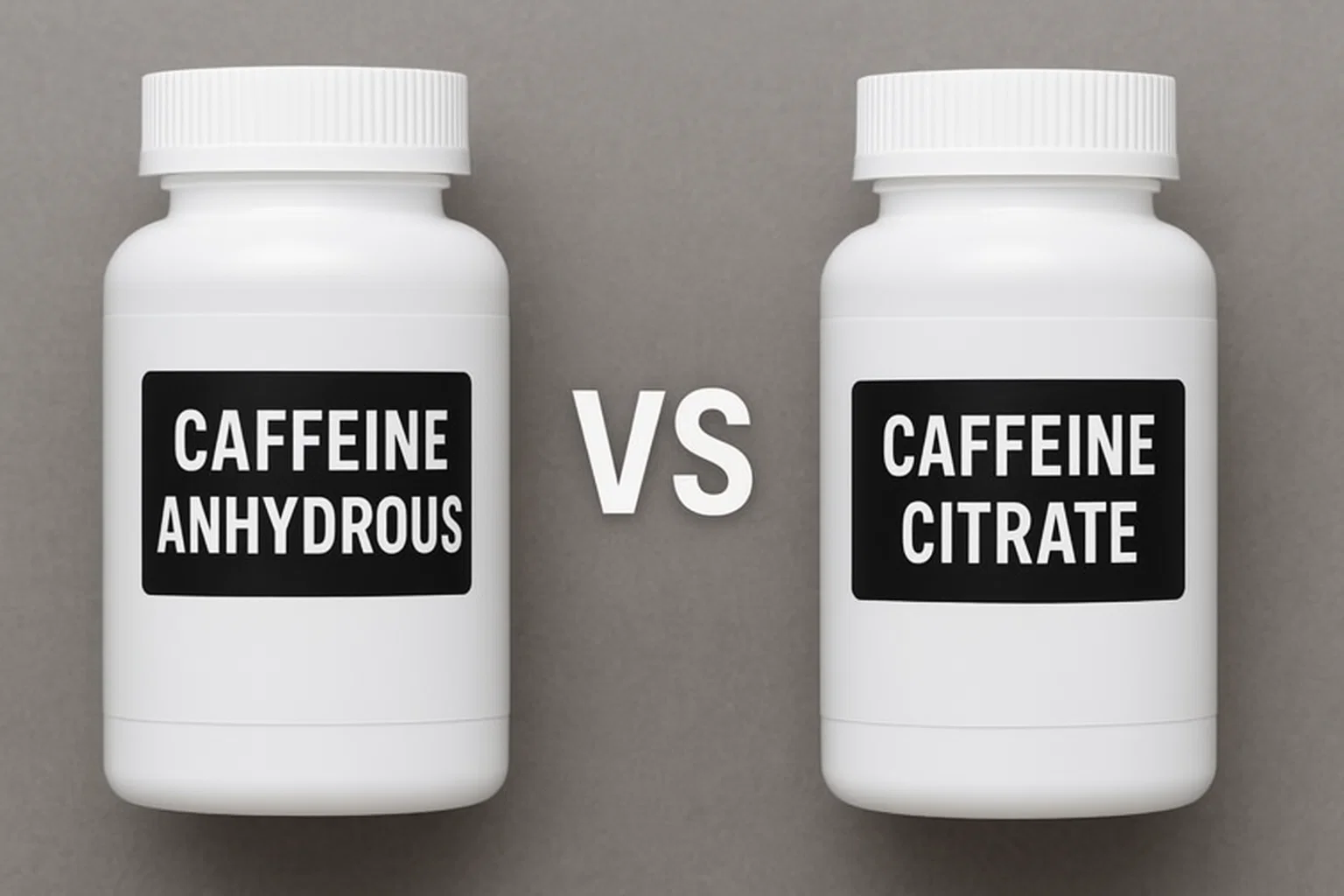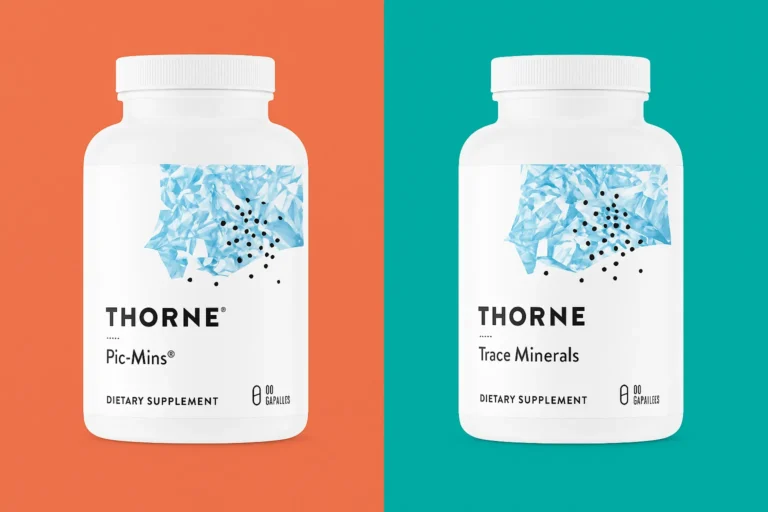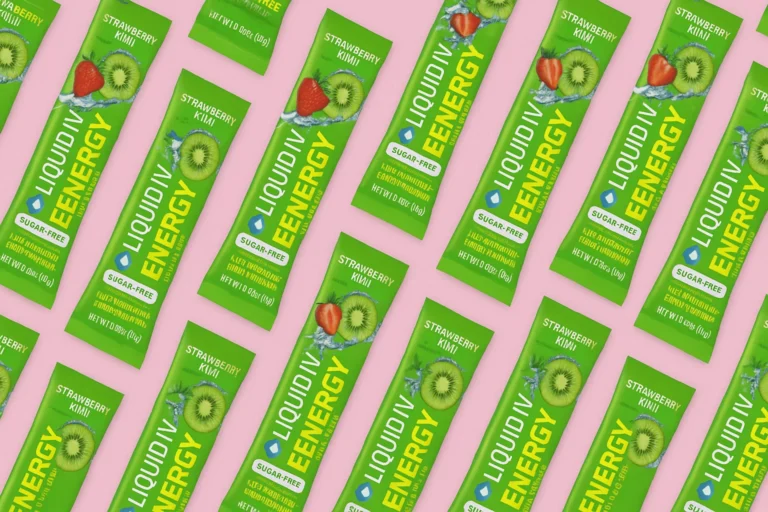Caffeine Anhydrous vs Caffeine Citrate: Which One Gives You the Best Boost?
When it comes to choosing the right stimulant for energy, focus, and performance, caffeine anhydrous vs caffeine citrate is a hot topic. Both are highly effective forms of caffeine used in supplements, pre-workouts, fat burners, and even some medications, but they’re not created equal.”
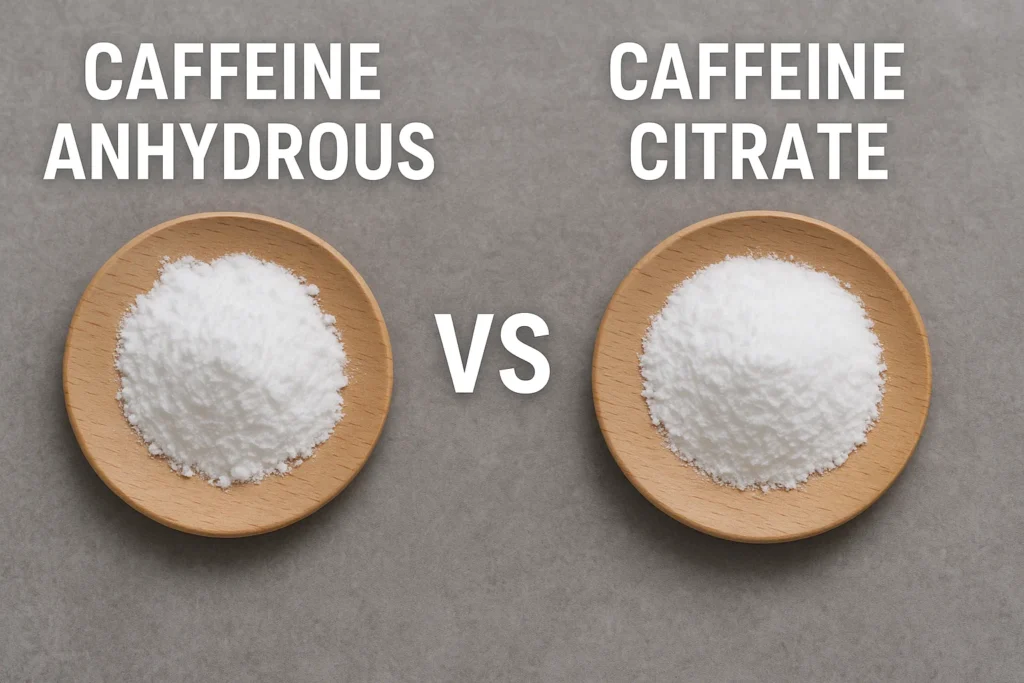
In this in-depth guide, we’ll break down the differences between caffeine citrate vs caffeine anhydrous, including how they work, which is faster, their benefits, side effects, and which is better for specific goals.
Table of Contents
What Is Caffeine Anhydrous?
Caffeine anhydrous is a dehydrated form of caffeine that comes from natural sources like coffee beans, tea leaves, or guarana. “Anhydrous” literally means “without water,” making it a concentrated powder that’s often used in energy pills, pre-workout supplements, and fat burners.
It delivers a powerful, fast-acting jolt to your central nervous system, increasing alertness, reducing fatigue, and improving physical performance.
Benefits of Caffeine Anhydrous
- Highly potent: Because it’s dehydrated, it offers a very concentrated dose of caffeine.
- Fast onset: It kicks in within 30 – 60 minutes.
- Boosts athletic performance: Studies have linked caffeine anhydrous to improved endurance and strength.
- Widely used in sports supplements: Pre-workouts, fat burners, and nootropics all commonly include it.
What Is Caffeine Citrate?
Caffeine citrate is a combination of caffeine anhydrous, citric acid, and sodium citrate. This mixture increases the solubility and absorption speed of the caffeine in your body. It is commonly used in medical settings, especially in treating premature infants for apnea, because it acts more rapidly than anhydrous caffeine.
You’ll also find caffeine citrate in some high-performance energy supplements where immediate energy is the goal.
Benefits of Caffeine Citrate
- Faster acting than caffeine anhydrous: It can begin working in as little as 15 minutes.
- Improved solubility: Easily absorbed by the body.
- Used medically: Especially helpful in respiratory therapy for neonates.
- Great for emergency wake-ups or pre-workout surges: Especially when time is of the essence.
Caffeine Anhydrous vs Caffeine Citrate: Key Differences
Let’s compare caffeine citrate vs caffeine anhydrous side by side across several key attributes:
| Feature | Caffeine Anhydrous | Caffeine Citrate |
|---|---|---|
| Form | Dehydrated caffeine powder | Caffeine + citric acid + sodium citrate |
| Absorption Speed | Moderate (30–60 minutes) | Fast (15–30 minutes) |
| Potency | Higher per gram (pure caffeine) | Slightly less potent due to additives |
| Use in Supplements | Common in fat burners & pre-workouts | Less common, used for fast-acting energy |
| Medical Use | Rare | Common in neonatal care |
| Taste | Bitter, often masked | Slightly sour due to citric acid |
How Caffeine Anhydrous Works
When you consume caffeine anhydrous, it travels to your brain and blocks adenosine receptors, which are responsible for making you feel tired. This boosts alertness, energy, and focus. It also increases the release of dopamine and norepinephrine, further enhancing your mental and physical performance.
Because it’s concentrated and has no extra compounds, caffeine anhydrous is easier to dose accurately in supplements.
How Caffeine Citrate Works
Caffeine citrate, on the other hand, works similarly but enters your bloodstream faster. The addition of citric acid and sodium citrate helps it dissolve quickly, bypassing slower digestive processes. This makes it ideal in situations where rapid stimulation is necessary.
Although it contains slightly less caffeine per gram than anhydrous, its speed of action can make up for that difference in scenarios where time is crucial, like an early morning workout or a mid-afternoon energy crash.
Caffeine citrate vs Caffeine Anhydrous: Which Is Better for Performance?
If your main goal is sports or gym performance, caffeine anhydrous is typically the go-to. It’s included in almost every serious pre-workout formula for a reason: it delivers consistent energy and improves strength, endurance, and mental focus.
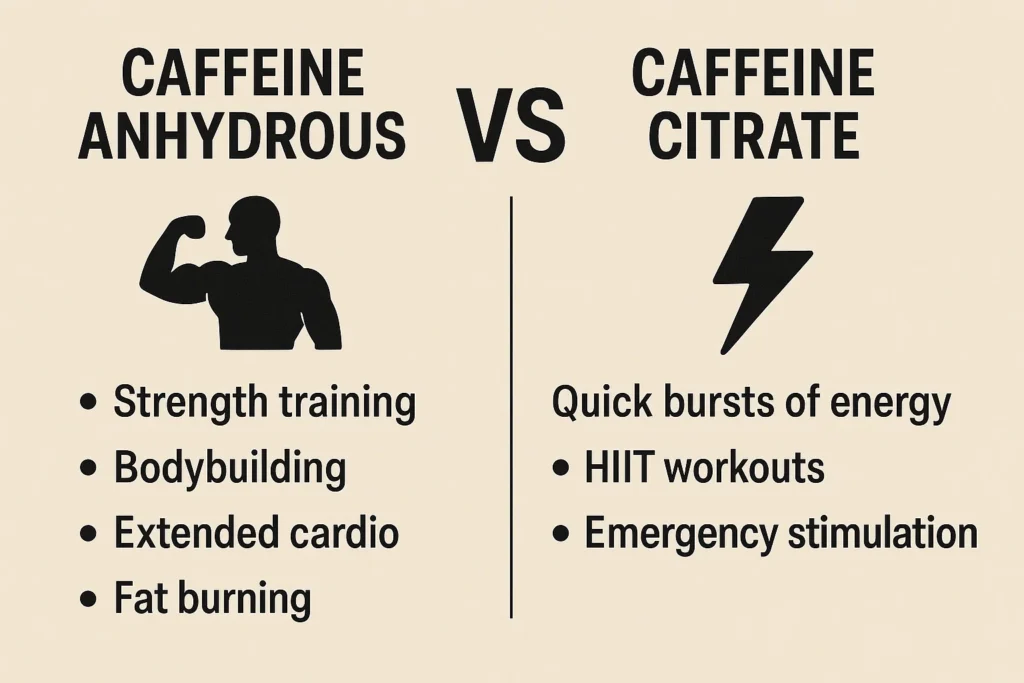
However, if you’re short on time and need immediate activation like waking up at 5 a.m. for a run, caffeine citrate might offer an advantage due to its rapid onset.
Best For:
- Caffeine Anhydrous: Strength training, bodybuilding, extended cardio, fat burning
- Caffeine Citrate: Quick bursts of energy, HIIT workouts, emergency stimulation
Side Effects of Caffeine Anhydrous vs Caffeine Citrate
Both types of caffeine can lead to common side effects if taken in excess:
- Jitters
- Increased heart rate
- Insomnia
- Headaches
- Anxiety
- Gastrointestinal upset
However, because caffeine citrate acts faster, it can sometimes feel more intense, especially for caffeine-sensitive individuals. You might feel a “spike” of energy more sharply than with caffeine anhydrous.
To avoid side effects:
- Start with a low dose (100-200 mg)
- Avoid consuming late in the day
- Stay hydrated
- Don’t mix with other stimulants unless guided
Dosage Comparison
When comparing caffeine anhydrous vs citrate, it’s important to understand how much caffeine you’re actually getting:
- Caffeine anhydrous is usually dosed between 100–300 mg in supplements.
- Caffeine citrate contains about 50% caffeine by weight, so a 200 mg dose provides ~100 mg of actual caffeine.
Always read labels carefully. If a supplement lists caffeine citrate, make sure it tells you the actual caffeine content, not just the total compound weight.
Is One Safer Than the Other?
From a safety perspective, both caffeine anhydrous and caffeine citrate are generally safe when used responsibly. However, due to its speed, caffeine citrate might pose a higher risk of overstimulation if not dosed properly.
People with:
- Heart conditions
- Anxiety disorders
- Sensitivity to stimulants
…may find caffeine anhydrous easier to tolerate due to its more gradual effect.
Which One Should You Choose?
Choosing between caffeine anhydrous vs caffeine citrate comes down to your specific needs and goals.
Choose caffeine anhydrous if you want:
- A more potent stimulant
- Consistent, longer-lasting energy
- Better value for money
- Classic pre-workout performance
Choose caffeine citrate if you want:
- Fast-acting energy
- A quick mental and physical boost
- Immediate alertness without waiting
Final Verdict: Caffeine Anhydrous vs Caffeine Citrate
Both forms of caffeine have their place in fitness, wellness, and everyday productivity. The choice between caffeine citrate vs anhydrous depends on how fast you need the caffeine to work and how your body responds to it.
If you’re looking for the most popular, research-backed form found in supplements, go for caffeine anhydrous. But if you’re in a time crunch or need super-quick stimulation, caffeine citrate is a solid, effective option.
Frequently Asked Questions (FAQs)
Is caffeine citrate stronger than caffeine anhydrous?
No. Caffeine anhydrous is more concentrated. However, caffeine citrate works faster, which may feel more intense in the short term.
Is caffeine citrate natural?
Not exactly. It’s a synthetic combination of caffeine with citric acid and sodium citrate to enhance absorption and solubility.
Can you combine caffeine anhydrous and caffeine citrate?
Some high-performance pre-workouts do combine both for a dual-phase effect: fast energy from citrate, and sustained energy from anhydrous.
Which is better for studying or mental focus?
Caffeine anhydrous is typically better due to its longer-lasting, steadier stimulation without sharp crashes.
Conclusion
Understanding the difference between caffeine anhydrous vs caffeine citrate helps you make smarter choices in supplements, workouts, and daily energy management. Whether you’re hitting the gym, heading into a long study session, or just need a quick boost, the right caffeine source makes all the difference.

With a Bachelor’s in Biology and Health and a Master’s degree in Quality Control of Foods and Drugs, I review dietary supplements using scientific analysis, ingredient verification, and safety standards to provide transparent and reliable recommendations.

